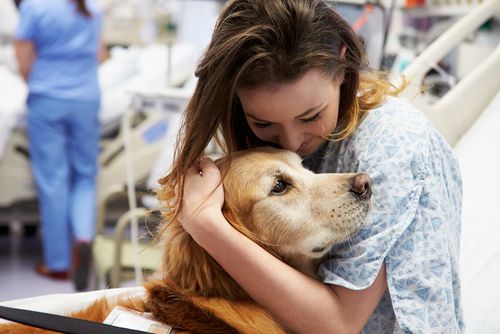What is Animal Therapy?
Like human beings, animals are sentient creatures. They, too, feel love, sadness, pain and confusion. Animal therapy is a safe, noninvasive way of helping them to recover from illness, manage pain, address behavioural issues, boost their energy levels and improve their overall health.
Animal therapy is a general term for an array of natural remedies used to treat injuries, negative emotions and age-related diseases affecting animals. It ranges from energy healing modalities like Reiki and EFT to manual therapies and natural medicine such as massage therapy and naturopathy.

Why Study Animal Therapy?
Taking a course in animal therapy will equip you with the tools to manage your pet's health in case they come down with an ailment or suffer from a behavioural or emotional problem. Also, you can use the knowledge and skills that you gain to complement primary veterinary care for the welfare of every animal.
Animal therapy is an essential modality that will benefit a lot of pet owners and their beloved furry or scaly friends. A qualification in animal therapy will pave the way for a fulfilling career where you get to work closely with veterinarians, zoologists and dog trainers, among other professionals who address the needs of animals.
What Does It Take to Study Animal Therapy or Become a Practitioner of It?
First and foremost, you must have a heart for animals because studying animal therapy entails physical interaction with all sorts of animals on a day-to-day basis. You must also hone your intuitive skills so that you can communicate effectively with these gentle creatures in a non-verbal way. Most important of all, be open to learning a variety of natural remedies that can help animals feel better.
Course and Study Options for Animal Therapy
There are different training programs available for animal therapy. You may sign up for a short course that focuses on a specific modality, say, canine massage therapy, Reiki for cats or equine kinesiology, to name a few examples. Although short and quick, such a program will provide you with the necessary skills to care for your pet when it is feeling unwell.
If you want to deepen your knowledge and be able to practise animal therapy on a professional level, you may pursue a certification program or a diploma-level qualification. You have the option to study in a face-to-face learning environment or through a blended learning system, but your preferred learning style must align with your needs.
How to Choose a School or Course in Animal Therapy
Do you want to pursue a degree in veterinary, train dogs and horses or set up a clinic that provides natural therapies for animals? Where you study animal therapy depends on what you wish to achieve from your education.
You want to make sure that your preferred course provider is a registered training organisation (RTO) recognised by peak professional associations for animal healers or therapists in Australia.
If you scroll to the top of this page, you'll find a list of the country's best training grounds for animal therapy. Besides their syllabus, take the time to ask about their course fees, delivery method and training duration. If you're partial to a specific animal, there is no better time to ask what course suits you best than now.





